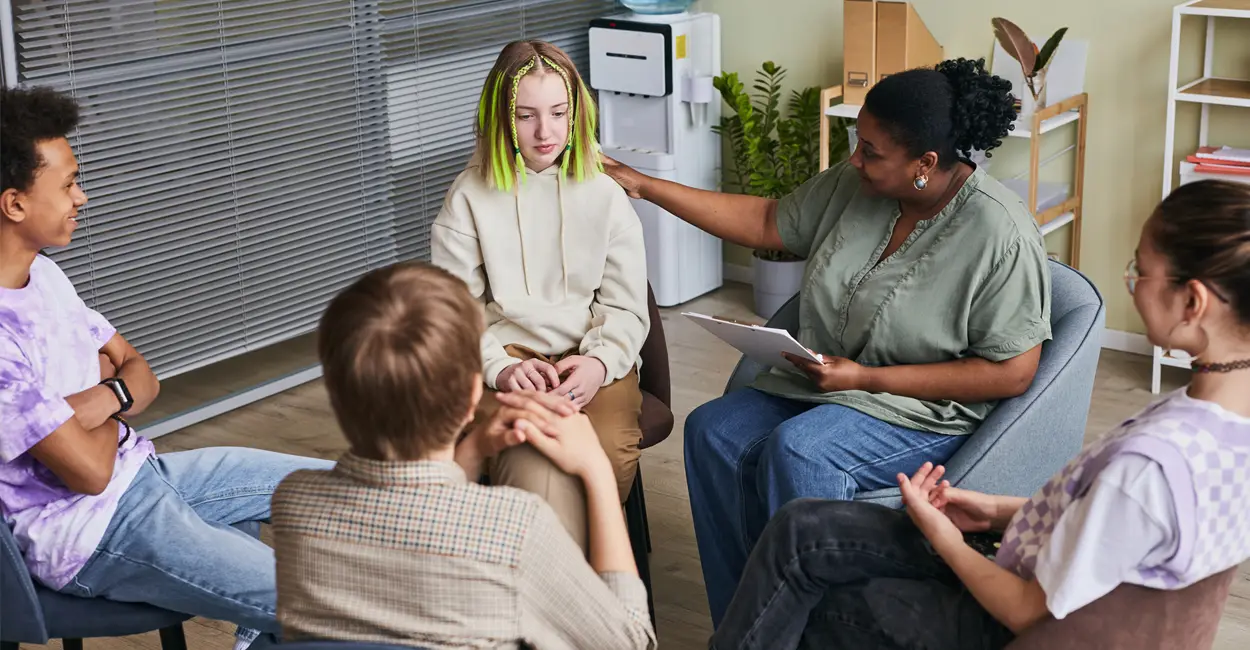24/7 Helpline:
(866) 899-221924/7 Helpline:
(866) 899-2219
Learn more about Ativan Rehab centers in Edwardsville

Other Insurance Options

Optima

BlueShield

GEHA

Evernorth

Aetna

Providence

ComPsych

Premera

Absolute Total Care

Molina Healthcare

AllWell

Amerigroup

Excellus

UnitedHealth Group

American Behavioral

WellCare Health Plans

Carleon

Magellan Health

WellPoint

EmblemHealth


Chautauqua Counseling Center
Chautauqua Counseling Center is a counseling clinic located in Kansas City, KS. Chautauqua Counselin...

Mirror – Kansas City Residential Treatment Program
Mirror is a non-profit agency dedicated to provide services to those individuals who are struggling ...

Alcohol Safety Action Project
Alcohol Safety Action Project is a private rehab located in Kansas City, Kansas. Alcohol Safety Acti...

Family Conservancy – Kansas City
Family Conservancy – Kansas City is a private rehab located in Kansas City, Kansas. Family Conservan...

Kansas Treatment Services
Kansas Treatment Services is a private rehab located in Kansas City, Kansas. Kansas Treatment Servic...

KVC Prairie Ridge Psychiatric Hospital
KVC Prairie Ridge Psychiatric Hospital is a private rehab located in Kansas City, Kansas. KVC Prairi...

Mirror – Kansas City Outpatient Treatment Program
Mirror is a non-profit agency dedicated to provide services to those individuals who are struggling ...

ReDiscover – Woodland
ReDiscover - Woodland offers outpatient substance use disorder program for men and women age 18 and ...

Kansas City Indian Center
Kansas City Indian Center is a public rehab located in Kansas City, Missouri. Kansas City Indian Cen...

Healing House
Healing House stands as a substance use disorder in Kansas City, MO. By providing safe and stable ho...

Midwest Recovery
Midwest Recovery is a full service alcohol and drug addiction recovery facility in Kansas City, Miss...

Sana Lake Behavioral Wellness Center Kansas City
Sana Lake Behavioral Wellness Center Kansas City is a private rehab located in Kansas City, Missouri...

Mental Health Clinic of Samuel Rodgers
Mental Health Clinic of Samuel Rodgers is a private rehab located in Kansas City, Missouri. Mental H...

Truman Medical Center Lakewood Medical – Medical Detox Services
The Truman Medical Center Lakewood Medical – Medical Detox Services is a hospital program that provi...

Mattie Rhodes Center
Mattie Rhodes Center is a community-driven organization in Kansas City, Missouri dedicated to enhanc...

Benilde Hall
The Benilde Hall facility provides dual-diagnosis addiction treatment in Kansas City, MO. With a com...

Crittenton Childrens Center – Outpatient
Crittenton Childrens Center – Outpatient is a private rehab located in Kansas City, Missouri. Critte...

ReDiscover – Catherine’s Place
The ReDiscover – Catherine’s Place is a CARF-accredited substance abuse rehab center located in Kans...

Heartland Center for Behavioral Change
Heartland Center for Behavioral Change is a private, not for profit, charitable organization dedicat...

Recovery Plus AA Group
Recovery Plus AA Group is a non-profit rehab located in Kansas City, Missouri. Recovery Plus AA Grou...

Gateway Foundation
Gateway Foundation is a private rehab located in Kansas City, Missouri. Gateway Foundation specializ...

Cornerstone of Care – Ozanam
Cornerstone of Care – Ozanam is a private rehab located in Kansas City, Missouri. Cornerstone of Car...

Swope Health Services – Behavioral
Swope Health Services - Behavioral is a non-profit organization located in Kansas City, MO. Swope He...

Northland Dependency Services
Northland Dependency Services is a private traditional rehab located in Kansas City, MO. Northland D...

Research Psychiatric Center
Research Psychiatric Center is located in Kansas City, Missouri. Research Psychiatric Center offers ...

Madison Avenue Psychological Services
Madison Avenue Psychological Services is a private rehab located in Kansas City, Missouri. Madison A...

ReDiscover – Transitions
ReDiscover - Transitions offers an opioid treatment program that assists people struggling with a na...

Preferred Family Healthcare – Adolescent Residential
Preferred Family Healthcare (PFH) is a CARF-accredited substance abuse rehab center in Kansas City, ...

First Call Alcohol and Drug Prevention and Recovery
First Call Alcohol and Drug Prevention and Recovery is a non-profit rehab located in Kansas City, Mi...

Guadalupe Centers Substance Abuse Program
Guadalupe Centers Substance Abuse Program offers outpatient program for individuals with addiction i...

The Crossroads Program
The Crossroads Program stands as a drug and alcohol rehab center providing a treatment program for a...

ReDiscover
ReDiscover is a nonprofit community mental health agency that offers a full spectrum of programs and...

Heartland Center for Behavioral Change – Free & Clean
Heartland Center's Free & Clean program serves adult men under Probation & Parole with the MO Dept. ...

ReDiscover – Loma Vista
ReDiscover - Loma Vista offers an opioid treatment program that assists people struggling with a nar...

Heartland Center for Behavioral Change – 1534 Campbell
Heartland Center for Behavioral Change provides behavioral healthcare and substance use disorder tre...











Newman Intervention and Addiction Treatment Services
Newman Intervention is a substance abuse treatment center located in Kansas City, KS. The facility s...

Associates at Hope Harbor Outpatient
Associates at Hope Harbor Outpatient is a private rehab located in Kansas City, Kansas. Associates a...

Addiction Stress Center
Addiction Stress Center is a private rehab located in Kansas City, Kansas. Addiction Stress Center s...

Serenity Counseling and Wellness Center
Serenity Counseling and Wellness Center is a private rehab located in Kansas City, Kansas. Serenity ...

Transitions Counseling Services
Transitions Counseling Services offers a variety of services including but not limited to: Individua...

Frontline Intervention Solution Today
Frontline Intervention Solution Today is a private rehab located in Kansas City, Kansas. Frontline I...

AA – Alcoholics Anonymous – Group
AA – Alcoholics Anonymous – Group is a non-profit rehab located in Kansas City, Missouri. AA – Alcoh...

Truman Medical Centers – Behavioral Health
Truman Medical Centers is a hospital located in Kansas City, MO. Truman Medical Centers specializes ...

Midwest Alcohol and Drug Program
Midwest Alcohol and Drug Program is a private rehab located in Kansas City, Missouri. Midwest Alcoho...

Tri County Mental Health Services – Parvin Road
The Tri-County Mental Health Services Parvin Road facility is a behavioral health center in Kansas C...

National Council on Alcohol and Drug Dependency
National Council on Alcohol and Drug Dependency is a private rehab located in Kansas City, Missouri....

Maranatha Treatment Program
Maranatha Treatment Program is a private rehab located in Kansas City, Missouri. Maranatha Treatment...

AA – Alcoholics Anonymous – Chapter 5 Claycomo Group
AA – Alcoholics Anonymous – Chapter 5 Claycomo Group is a non-profit rehab located in Kansas City, M...

Alcohol Recovery Care Unit
Alcohol Recovery Care Unit is a private rehab located in Kansas City, Missouri. Alcohol Recovery Car...

Synergy Services
Synergy Services is a private rehab located in Kansas City, Missouri. Synergy Services specializes i...

One Step Ministry
One Step Ministry is a private rehab located in Kansas City, Missouri. One Step Ministry specializes...

Tri County Mental Health Services – Maple Woods
Tri County Mental Health Services – Maple Woods is a non-profit rehab located in Kansas City, Missou...

Rodgers South
Rodgers South is a private rehab located in Kansas City, Missouri. Rodgers South specializes in the ...

AA – Alcoholics Anonymous – Twelve and Twelve Group
AA – Alcoholics Anonymous – Twelve and Twelve Group is a non-profit rehab located in Kansas City, Mi...

Behavioral Health Group
Behavioral Health Group is a private rehab located in Kansas City, Missouri. Behavioral Health Group...

Imani House
Swope Health Services - Imani House is an outpatient rehab located in Kansas City, MO. Swope Health ...

AA – We Are One
We Are One Alcoholics Anonymous is a non-profit rehab located in Kansas City, MO. We Are One Alcohol...

A Reality of Mind Counseling Services
A Reality of Mind Counseling Services is a private rehab located in Kansas City, Missouri. A Reality...

Tri County Mental Health Services
Tri County Mental Health Services is a non-profit rehab located in Kansas City, Missouri. Tri County...

Scott Greening Dependency Center
Scott Greening Dependency Center is a private rehab located in Kansas City, Missouri. Scott Greening...

AA – Alcoholics Anonymous – We Are One Group
AA – Alcoholics Anonymous – We Are One Group is a non-profit rehab located in Kansas City, Missouri....

AA – Alcoholics Anonymous – Swift Avenue
AA – Alcoholics Anonymous – Swift Avenue is a non-profit rehab located in Kansas City, Missouri. AA ...

Salvation Army – Shield of Service
Salvation Army – Shield of Service is a non-profit rehab located in Kansas City, Missouri. Salvation...

Two Rivers Behavioral Health System
Two Rivers Behavioral Health System is a private rehab located in Kansas City, Missouri. Two Rivers ...

AA – Alcoholics Anonymous – P III
AA – Alcoholics Anonymous – P III is a non-profit rehab located in Kansas City, Missouri. AA – Alcoh...

Nara Outpatient
Nara Outpatient is a private rehab located in Kansas City, Missouri. Nara Outpatient specializes in ...

Sober 1 House of Hope
Sober 1 House of Hope is a sober living facility that offers treatment for patients that are recover...

Truman Medical Centers – Community Treatment
Truman Medical Centers – Community Treatment is a private rehab located in Kansas City, Missouri. Tr...

AA – Alcoholics Anonymous – Riverpark Group
AA – Alcoholics Anonymous – Riverpark Group is a non-profit rehab located in Kansas City, Missouri. ...

Alano Society of Alcoholics Anonymous
Alano Society of Alcoholics Anonymous is a non-profit rehab located in Kansas City, Missouri. Alano ...

AA – Alcoholics Anonymous – Information Center
AA – Alcoholics Anonymous – Information Center is a non-profit rehab located in Kansas City, Missour...

ReDiscover – Friendship House
ReDiscover - Friendship House serves women and women with children during the first 30 days of recov...

AA – Alcoholics Anonymous – Olive Street
AA – Alcoholics Anonymous – Olive Street is a non-profit rehab located in Kansas City, Missouri. AA ...

ReDiscover – COED Residential
ReDiscover - COED Residential provides residential housing for men and women (age 18 and over) in re...











